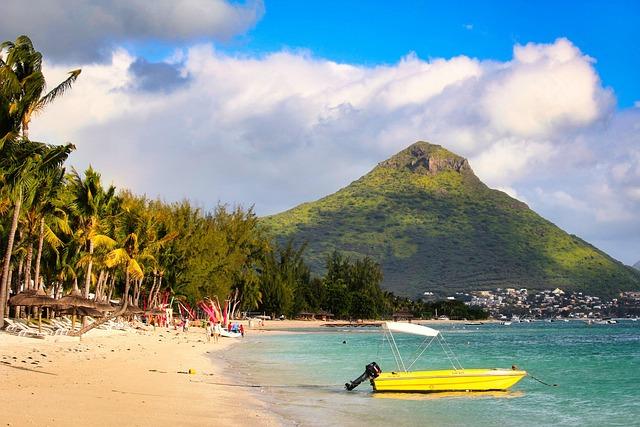In a significant diplomatic gesture, the United States has extended its congratulations to newly elected Prime Minister of Mauritius, Navin Ramgoolam, marking a pivotal moment in the nation’s political landscape.Following a closely contested election, Ramgoolam’s return to leadership promises to shape the future of this Indian Ocean island nation, known for its vibrant democracy and strategic regional role. The U.S. government’s acknowledgment not only reflects the importance of bilateral relations but also underscores the vital partnership between the two nations in addressing shared challenges and opportunities. This article will delve into the implications of Ramgoolam’s election, the historical context of U.S.-Mauritius relations, and the broader regional dynamics at play.
US Reaction to Mauritius Prime Minister-Elect Ramgoolam’s Victory
The United States has officially congratulated the newly elected Prime Minister of Mauritius, Navin Ramgoolam, following his decisive victory in the recent elections.In a statement issued by the U.S. Department of State, officials expressed their eagerness to strengthen diplomatic relations with Mauritius under Ramgoolam’s leadership. The U.S. highlighted several areas of mutual interest that could benefit both nations, including trade, maritime security, and climate change mitigation. This support indicates a continued commitment to fostering stability and democratic governance in the region.
Key points from the U.S. reaction include:
- Promotion of Democratic Values: The U.S. commended the electoral process in Mauritius and emphasized the importance of upholding democratic principles.
- Strengthening Economic Ties: A focus on potential trade agreements that could enhance economic collaboration.
- Regional Security: Cooperation in maritime security initiatives, especially in the Indian Ocean region.
As the new leadership embarks on its term, both nations are poised to explore avenues for collaboration that align with their national interests and shared values.
Implications for U.S.-Mauritius Relations Under New Leadership
The recent election of prime Minister-elect Ramgoolam marks a pivotal moment in U.S.-Mauritius relations, potentially setting the stage for renewed partnerships and collaboration on various fronts. Under his leadership, there is an expectation of a more robust diplomatic engagement between the two nations. Key areas of focus may include:
- Economic Collaboration: Strengthening trade agreements to foster economic growth.
- security Cooperation: Enhancing maritime security and combating piracy in the Indian Ocean.
- Environmental Initiatives: Joint efforts in addressing climate change and protecting biodiversity.
As Mauritius navigates its new political landscape, the U.S. is likely to engage strategically, recognizing the island’s geostrategic importance. Ramgoolam’s administration could leverage this opportunity to advocate for increased foreign investment and technology transfer, which would not only bolster the local economy but also serve U.S. interests in the region. With growing geopolitical tensions, this partnership might also serve as a model for U.S. diplomacy in Africa, prioritizing mutual respect and collaborative development. The upcoming months will be critical in determining how effectively both nations can enhance their ties for shared prosperity.
Key Challenges Facing Prime Minister-Ramgoolam’s Administration
The administration of Prime Minister Ramgoolam is poised to confront several critical challenges that will test its governance and influence in the region. One of the foremost issues is the economic recovery following the global impact of the COVID-19 pandemic. With many sectors still reeling, the government must devise strategies to boost tourism and investments while addressing rising unemployment rates. Additionally, the inflation crisis poses a significant challenge, with many families struggling to afford basic necessities.The administration must find a balance between mitigating inflationary pressures and fostering economic growth.
Another pressing concern revolves around climate change, notably as Mauritius is highly vulnerable to its effects. The administration must prioritize developing sustainable practices and enhancing disaster management systems to protect the island’s unique biodiversity and habitats. Furthermore, social cohesion is paramount, as the new government needs to navigate ethnic and cultural diversity while ensuring all groups feel represented and included. The triumphant management of these intertwined challenges will be crucial for the administration’s legitimacy and the overall stability of Mauritius.
Opportunities for Economic Collaboration between the Two Nations
the recent election of Prime Minister ramgoolam opens a new chapter in the economic relationship between the United States and Mauritius, presenting a variety of potential avenues for collaboration. The strategic geographical location of Mauritius in the Indian Ocean positions it as a vital trade hub, creating opportunities for both nations to enhance import-export activities. Key areas for consideration include:
- Trade Agreements: Strengthening bilateral trade agreements could facilitate smoother commerce, potentially lowering tariffs and enhancing market access for American goods and Mauritian products.
- Investment in Infrastructure: The US could provide funding and expertise in infrastructure projects, essential for boosting Mauritius’ capacity in tourism and logistics.
- Technology Transfer: Collaboration in technology sectors, particularly in renewable energy and facts technology, could foster innovation and sustainability in both markets.
- Tourism Development: Joint initiatives to promote Mauritius as a tourist destination could increase visitor numbers from the US, benefiting both economies.
Moreover, a focus on regional cooperation in the Indian Ocean can spur economic growth through shared initiatives aimed at addressing common challenges such as climate change and maritime security. The US and Mauritius can explore cooperative frameworks in various sectors, including:
| Sector | Potential Collaborative Projects |
|---|---|
| Renewable Energy | Joint solar and wind energy projects to reduce reliance on fossil fuels. |
| Agriculture | Development of sustainable farming practices via knowledge exchange. |
| Health | Collaborative health initiatives focusing on disease prevention and healthcare accessibility. |
| Education | Exchange programs aimed at enhancing educational opportunities for students in both countries. |
International Community’s Role in Supporting Democratic Governance in Mauritius
The international community plays a pivotal role in fostering democratic governance, particularly in nations like Mauritius, where political dynamics can influence regional stability. Global entities, including the United States, have historically supported democratic frameworks through various means, such as diplomatic engagement, economic assistance, and promotion of human rights. as Prime Minister-elect Ramgoolam embarks on his leadership journey, it is vital for international organizations to reinforce their commitment to democratic values by:
- Providing technical assistance for electoral processes
- Encouraging civil society engagement and political participation
- Facilitating dialog between political parties to ensure stability
- Monitoring human rights situations and promoting accountability
Furthermore, countries can enhance their support by collaborating with local governance institutions to strengthen democratic practices. By doing so,they can contribute to a political environment that embraces clarity and inclusivity. The international community can also play a role in addressing challenges that threaten democracy, such as:
| Challenge | Impact | International Response |
|---|---|---|
| Political Polarization | Undermines unity and governance | Facilitated dialogue programs |
| Corruption | Erodes public trust | Support anti-corruption initiatives |
| Limited Media Freedom | Affects information transparency | Promote free press initiatives |
By addressing these challenges collaboratively, the international community can ensure that the democratic transition in Mauritius is not only nurtured but sustained in the long run, fostering an environment where citizens can actively participate in shaping their governance.
Key Takeaways
the recent congratulatory message from the United States to Mauritius Prime Minister-elect Ramgoolam marks a significant moment in the ongoing diplomatic relations between the two nations. As Mauritius transitions under new leadership, the U.S. aims to reinforce its commitment to supporting democratic governance and economic development in the region. Observers will be keen to see how Ramgoolam’s administration will navigate both domestic and international challenges, and whether this new partnership can foster mutual growth and stability in the Indian Ocean. With a strong emphasis on collaboration, the future appears promising for both Mauritius and its allies as they work together towards shared goals.

